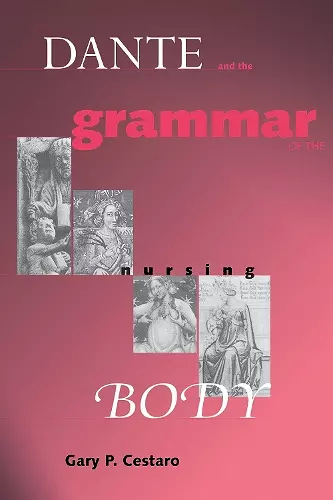Dante and the Grammar of the Nursing Body
Format:Hardback
Publisher:University of Notre Dame Press
Published:3rd Sep '03
Currently unavailable, and unfortunately no date known when it will be back
This hardback is available in another edition too:
- Paperback£32.00(9780268025540)

Dante and the Grammar of the Nursing Body takes a serious look at Dante's relation to Latin grammar and the new "mother tongue"-Italian vernacular-by exploring the cultural significance of the nursing mother in medieval discussions of language and selfhood. Inspired by Julia Kristeva's meditations on the maternal semiotic, Cestaro's book uncovers ancient and medieval discourses that assert the nursing body's essential role in the development of a mature linguistic self.
The opening chapters locate traces of the nursing motif in Dante's minor works and particularly in his Latin treatise on the mother tongue, De vulgari eloquentia. Cestaro argues that a primal scene of suckling motivates the poet's musings on language and brings the work to its premature end. Subsequent chapters explore the evolution of the nursing body in the Comedy: from the parodic anti-nurse of Inferno (archetypically Circe with her poison milk), to the Christian deconstruction and reconstruction of selfhood in intimate association with female nursing on the mountain of Purgatorio. The book ends in Paradiso with a dramatic metaphorical celebration of the nursing body as a site of eternal truth and emblem of the resurrected body promised by medieval Christianity.
“Cestaro marshals an impressive array of material, within and outside the Dante corpus, in the service of materializing Dante beyond the hypostases of classical virility and its modern critical analogues. Additionally, Cestaro writes like a charm.” —Modern Philology
“… a highly intelligent and engaging read. Cestaro writes with great breadth. The book offers a nice balance of historical and theoretical readings of many thinkers to whom Dante was indebted while cultivating our appreciation for the artistry and luminosity of the Commedia.” —Comitatus: A Journal of Medieval and Renaissance Studies
"Cestaro's subtle, complex, and thought-provoking book is a welcome demonstration of how much can be gained by reading the Commedia not only as a product of preceding traditions but also as an anticipation of themes central to thinkers such as Kristeva and Lacan. …his thesis offers a cogent challenge to the standard view that the poem tends ultimately towards evanescence and the diminution of corporeality, for Cestaro recognizes that at the heart of the Paradiso there is an affirmation of the body as a site of joyous process." —MLR
"Gary Cestaro's study of the nursing body, language, and salvation in Dante's De vulgari eloquentia, Convivio, and Commedia constitutes a remarkable contribution to both Dante studies and the flourishing fields of gender and sexuality studies. This book about Dante's disinterment and resurrection of the permeable, reproductive, fluid, nurturing body as the primal signifier is groundbreaking (in several senses) and will invigorate many further investigations." —Speculum
* SpeculISBN: 9780268025533
Dimensions: 229mm x 152mm x 19mm
Weight: 599g
320 pages